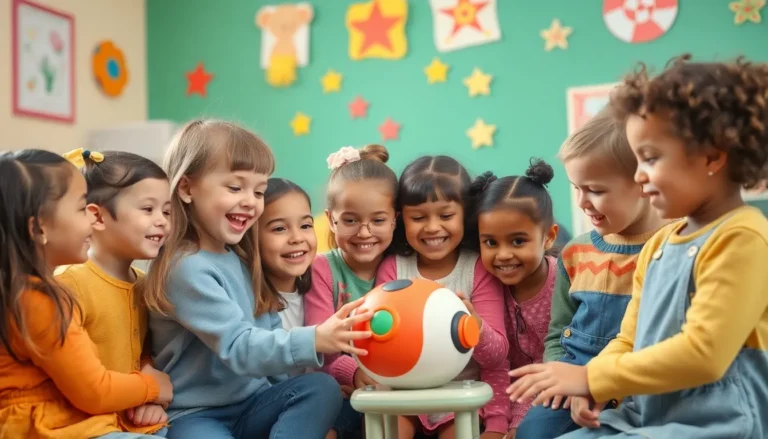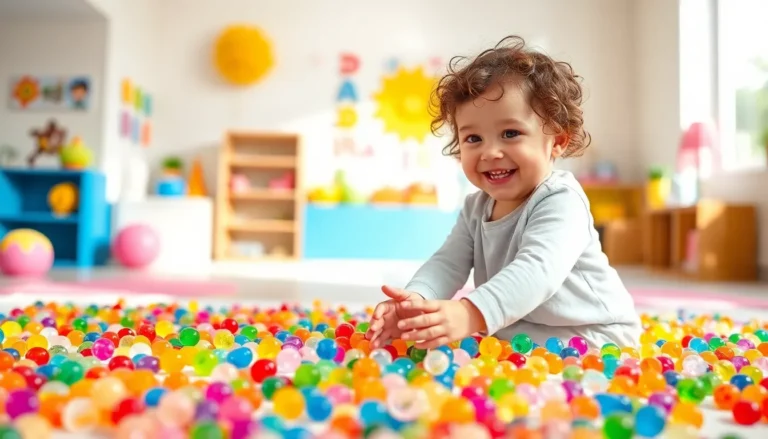Table of Contents
ToggleIn a world where toddlers seem to have an endless supply of energy and curiosity, it’s time to channel that enthusiasm into some academic fun. Forget the myth that learning has to be boring; with the right activities, toddlers can explore numbers, letters, and shapes while giggling all the way. Imagine a world where counting snacks becomes a math lesson and singing the alphabet turns into a dance party.
Importance Of Toddler Academic Activities
Toddler academic activities play a crucial role in early development. Engaging in these activities strengthens cognitive skills. Children develop essential skills in areas such as language, numeracy, and critical thinking.
Exploratory play supports brain development. Activities like sorting, counting, and reading stimulate neural connections. Hands-on experiences reinforce concepts in a tangible way.
Structured activities encourage social skills. Interaction with peers during group activities fosters cooperation and communication. Sharing resources and taking turns promote a sense of community.
Developing a love for learning cultivates curiosity. Introducing toddlers to diverse subjects can open up new interests. Varied activities enhance their ability to adapt to different learning environments. This adaptability becomes a foundational skill as they grow.
Positive reinforcement during academic activities builds confidence. Celebrating small achievements encourages persistence. A nurturing atmosphere allows toddlers to explore without fear of failure.
Incorporating fun into learning transforms academic activities into enjoyable experiences. Playful methods capture attention and make retention easier. Using games to teach shapes or numbers can lead to a deeper understanding.
Recognizing individual learning styles enhances effectiveness. Some toddlers may thrive through visual learning, while others prefer auditory or kinesthetic experiences. Tailoring activities to fit these styles ensures maximum engagement.
Fostering a supportive learning environment promotes long-term academic success. Early exposure to structured activities gives toddlers a head start in their educational journey. Creating a balance between play and learning optimizes their growth and development.
Types Of Toddler Academic Activities

Engaging toddlers in academic activities encompasses various interactive approaches that nurture development. These activities promote cognitive growth while encouraging enjoyment.
Creative Arts And Crafts
Creative arts and crafts stimulate toddlers’ imaginations while enhancing fine motor skills. Engaging in activities like finger painting or collage-making fosters self-expression. Using everyday materials such as recycled paper and crayons helps develop problem-solving abilities. Toddlers learn to follow instructions, explore textures, and experiment with colors. Incorporating themes like animals or seasons can spark curiosity and broaden their understanding of the world. Fun projects may also involve parents or caregivers, promoting bonding while showcasing each child’s unique creativity.
Early Literacy Activities
Early literacy activities pave the way for strong reading skills. Reading picture books aloud introduces language and vocabulary. Singing songs and nursery rhymes enhances phonetic awareness and rhythm. Activities like letter scavenger hunts encourage toddlers to recognize letters in their environment. Creating simple stories with puppets allows them to express thoughts and ideas. Additionally, using flashcards with images and words develops word association skills. Encouraging storytelling fosters a love for reading, ensuring toddlers approach language with enthusiasm.
Simple Math Games
Simple math games make learning numbers enjoyable for toddlers. Count-a-thon activities, such as counting toys or snacks, reinforce number recognition and counting skills. Sorting objects based on color or shape introduces early categorization concepts. Incorporating songs and rhymes about numbers adds an element of fun that engages their attention. Using everyday situations, like setting the table or shopping, offers practical experiences in addition and subtraction. These playful methods create a solid foundation for numeracy, encouraging toddlers to embrace math with confidence.
How To Implement Toddler Academic Activities
Implementing toddler academic activities involves thoughtful planning and creativity. Engaging toddlers with a variety of activities enhances their learning experience significantly.
Creating A Balanced Schedule
Balancing activities throughout the day ensures effective learning and playtime. Incorporating structured academic activities alongside free play helps maintain toddler interest. Designating specific times for various subjects allows for an organized approach to learning. Mixing simple math games with storytelling sessions facilitates cognitive growth. Flexibility within the schedule permits adaptation based on the toddler’s mood and energy levels, promoting an enjoyable learning environment. Ensuring a blend of indoor and outdoor activities not only keeps toddlers engaged but also supports physical development.
Using Everyday Opportunities For Learning
Everyday moments often serve as rich learning experiences. Counting snacks while preparing meals introduces basic numeracy concepts. Recognizing shapes and colors in the environment fosters early literacy skills. Incorporating music during transportation transforms mundane trips into fun learning opportunities. Asking open-ended questions during routine tasks encourages critical thinking. Utilizing everyday interactions also cultivates social skills by prompting conversations and engagement with peers. Observing toddlers as they explore their surroundings reveals numerous teachable moments, enabling caregivers to maximize learning potential without overwhelming the child.
Tips For Encouraging Participation
Encouraging participation in toddler academic activities fosters engagement. Making learning fun stands as a primary strategy.
Making Learning Fun
Incorporating play into learning captures toddlers’ attention. Activities that blend games with educational concepts create enjoyable experiences. Engaging methods, like counting colorful blocks or singing educational songs, promote active involvement. Schedule consistent, varied activities to sustain interest. Use themes, such as animals or colors, to spark curiosity and facilitate exploration. Incorporating storytelling makes lessons relatable and memorable. By prioritizing enjoyment, caregivers can nurture a love for learning in toddlers.
Providing Positive Reinforcement
Positive reinforcement cultivates motivation in toddlers. Praising efforts, regardless of outcomes, builds confidence and encouragement. Specific compliments, like recognizing a child’s counting skills, enhance the effectiveness of praise. Rewards, such as stickers or extra playtime, add excitement to participation. Celebrate achievements, both big and small, to reinforce the value of learning. Maintaining an enthusiastic and supportive atmosphere strengthens bonds and fosters continuous engagement. Overall, combining positive feedback with academic activities cultivates a rich learning environment.
Fostering a love for learning in toddlers is essential for their overall development. Engaging them in fun academic activities not only enhances cognitive skills but also strengthens social connections. By incorporating playful experiences into everyday routines caregivers can create a rich learning environment that nurtures curiosity and adaptability.
Balancing structured activities with free play ensures that toddlers remain interested and motivated. Tailoring activities to individual learning styles further enhances engagement and enjoyment. As toddlers explore numbers letters and shapes through interactive play they build confidence and a lifelong passion for learning.








